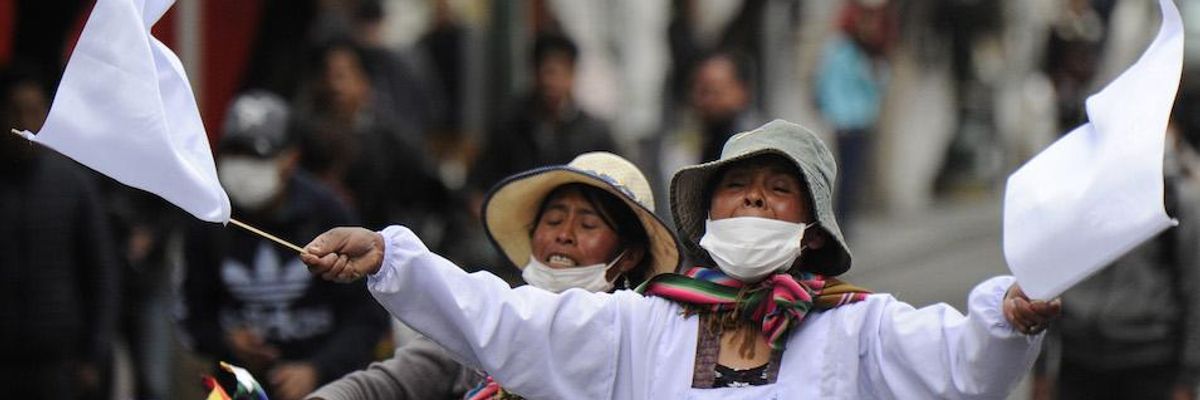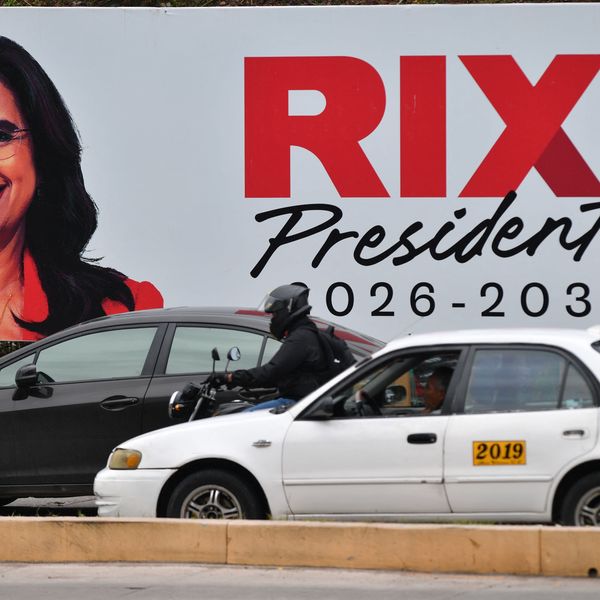
A supporter of Bolivian ex-President Evo Morales waves white flags during clashes with riot police following a protest in La Paz on November 13, 2019. (Photo: Jorge Bernl/AFP/Getty Images)
'We Don't Want Any Dictators': Bolivians Flood Streets to Protest Right-Wing, Anti-Indigenous Coup
"Anti-Indigenous racism is at the heart of what's happening in Bolivia."
Unrest continued in Bolivia Thursday as protests against the right-wing coup that unseated democratically-elected President Evo Morales on Sunday and the anti-Indigenous ideology behind it entered their fourth day.
Demonstrators filled the streets of the Bolivian capitol, La Paz, waving the indigenous wiphala flag and registering their disapproval of the new interim government of Jeanine Anez.
"We don't want any dictators," protester Paulina Luchampe told Time Magazine on Wednesday. "This lady has stepped on us--that's why we're so mad."
\u201c#Bolivia anti-coup protests continue. #NoAlGolpe (foto h/t @jmkarg)\u201d— Eva Golinger (@Eva Golinger) 1573698385
New president Anez has come under criticism for a history of comments promoting an extreme right-wing Christian theocratic ideology, including referring to the country's Indigenous population as "satanic."
Members of the country's police and military forces, whose support for the coup over the weekend precipitated Morales' resignation Sunday, have been photographed cutting the wiphala flag off of their uniforms.
"Anti-Indigenous racism is at the heart of what's happening in Bolivia," tweeted Cherokee activist and writer Rebecca Nagle.
\u201cAnti-Indigenous racism is at the heart of what\u2019s happening in Bolivia.\u201d— Rebecca Nagle (@Rebecca Nagle) 1573702946
Right-wing militias burning the flag and attacking the country's Indigenous protest movement mean that the conflict is more than just about political differences, said Bolivian feminist Adriana Guzman--it's about the country's right-wing being opposed to everything the Morales government stood for.
"The coup d'etat is against all of that," said Guzman. "That's why they degrade. That's why they punish. That's why they burn the Indigenous wiphala flag."
Protests continued on Thursday.
\u201c#AHORA | Habitantes de la comunidad de El Alto se movilizan contra el golpe de Estado y el Gobierno de facto instaurado en #Bolivia. V\u00eda @FreddyteleSUR \n\nSigue los detalles aqu\u00ed >> https://t.co/tqMKHfl0b4\u201d— teleSUR TV (@teleSUR TV) 1573750804
\u201cNumerosa manifestaci\u00f3n de sectores populares ingresa a la ciudad de La Paz en rechazo a nuevo gobierno.\u201d— Freddy Morales (@Freddy Morales) 1573749304
In an opinion piece for The Guardian, Nick Estes, co-founder and editor of The Red Nation, said that the difference between the two camps in Bolivia is clear.
"The future of Bolivia is currently marching in the streets, the millions of people who voted for Evo in the last elections, the 47% whose voices and votes were stolen by the violent return of the old, colonial oligarchy," wrote Estes.
Protester Luchampe said she hoped the protests would continue until there is a resolution to the conflict that undoes the coup.
"We're going to fight with our brothers and sisters until Evo Morales is back," said Luchampe. "We ask for his return. He needs to put the house in order."
An Urgent Message From Our Co-Founder
Dear Common Dreams reader, The U.S. is on a fast track to authoritarianism like nothing I've ever seen. Meanwhile, corporate news outlets are utterly capitulating to Trump, twisting their coverage to avoid drawing his ire while lining up to stuff cash in his pockets. That's why I believe that Common Dreams is doing the best and most consequential reporting that we've ever done. Our small but mighty team is a progressive reporting powerhouse, covering the news every day that the corporate media never will. Our mission has always been simple: To inform. To inspire. And to ignite change for the common good. Now here's the key piece that I want all our readers to understand: None of this would be possible without your financial support. That's not just some fundraising cliche. It's the absolute and literal truth. We don't accept corporate advertising and never will. We don't have a paywall because we don't think people should be blocked from critical news based on their ability to pay. Everything we do is funded by the donations of readers like you. Will you donate now to help power the nonprofit, independent reporting of Common Dreams? Thank you for being a vital member of our community. Together, we can keep independent journalism alive when it’s needed most. - Craig Brown, Co-founder |
Unrest continued in Bolivia Thursday as protests against the right-wing coup that unseated democratically-elected President Evo Morales on Sunday and the anti-Indigenous ideology behind it entered their fourth day.
Demonstrators filled the streets of the Bolivian capitol, La Paz, waving the indigenous wiphala flag and registering their disapproval of the new interim government of Jeanine Anez.
"We don't want any dictators," protester Paulina Luchampe told Time Magazine on Wednesday. "This lady has stepped on us--that's why we're so mad."
\u201c#Bolivia anti-coup protests continue. #NoAlGolpe (foto h/t @jmkarg)\u201d— Eva Golinger (@Eva Golinger) 1573698385
New president Anez has come under criticism for a history of comments promoting an extreme right-wing Christian theocratic ideology, including referring to the country's Indigenous population as "satanic."
Members of the country's police and military forces, whose support for the coup over the weekend precipitated Morales' resignation Sunday, have been photographed cutting the wiphala flag off of their uniforms.
"Anti-Indigenous racism is at the heart of what's happening in Bolivia," tweeted Cherokee activist and writer Rebecca Nagle.
\u201cAnti-Indigenous racism is at the heart of what\u2019s happening in Bolivia.\u201d— Rebecca Nagle (@Rebecca Nagle) 1573702946
Right-wing militias burning the flag and attacking the country's Indigenous protest movement mean that the conflict is more than just about political differences, said Bolivian feminist Adriana Guzman--it's about the country's right-wing being opposed to everything the Morales government stood for.
"The coup d'etat is against all of that," said Guzman. "That's why they degrade. That's why they punish. That's why they burn the Indigenous wiphala flag."
Protests continued on Thursday.
\u201c#AHORA | Habitantes de la comunidad de El Alto se movilizan contra el golpe de Estado y el Gobierno de facto instaurado en #Bolivia. V\u00eda @FreddyteleSUR \n\nSigue los detalles aqu\u00ed >> https://t.co/tqMKHfl0b4\u201d— teleSUR TV (@teleSUR TV) 1573750804
\u201cNumerosa manifestaci\u00f3n de sectores populares ingresa a la ciudad de La Paz en rechazo a nuevo gobierno.\u201d— Freddy Morales (@Freddy Morales) 1573749304
In an opinion piece for The Guardian, Nick Estes, co-founder and editor of The Red Nation, said that the difference between the two camps in Bolivia is clear.
"The future of Bolivia is currently marching in the streets, the millions of people who voted for Evo in the last elections, the 47% whose voices and votes were stolen by the violent return of the old, colonial oligarchy," wrote Estes.
Protester Luchampe said she hoped the protests would continue until there is a resolution to the conflict that undoes the coup.
"We're going to fight with our brothers and sisters until Evo Morales is back," said Luchampe. "We ask for his return. He needs to put the house in order."
Unrest continued in Bolivia Thursday as protests against the right-wing coup that unseated democratically-elected President Evo Morales on Sunday and the anti-Indigenous ideology behind it entered their fourth day.
Demonstrators filled the streets of the Bolivian capitol, La Paz, waving the indigenous wiphala flag and registering their disapproval of the new interim government of Jeanine Anez.
"We don't want any dictators," protester Paulina Luchampe told Time Magazine on Wednesday. "This lady has stepped on us--that's why we're so mad."
\u201c#Bolivia anti-coup protests continue. #NoAlGolpe (foto h/t @jmkarg)\u201d— Eva Golinger (@Eva Golinger) 1573698385
New president Anez has come under criticism for a history of comments promoting an extreme right-wing Christian theocratic ideology, including referring to the country's Indigenous population as "satanic."
Members of the country's police and military forces, whose support for the coup over the weekend precipitated Morales' resignation Sunday, have been photographed cutting the wiphala flag off of their uniforms.
"Anti-Indigenous racism is at the heart of what's happening in Bolivia," tweeted Cherokee activist and writer Rebecca Nagle.
\u201cAnti-Indigenous racism is at the heart of what\u2019s happening in Bolivia.\u201d— Rebecca Nagle (@Rebecca Nagle) 1573702946
Right-wing militias burning the flag and attacking the country's Indigenous protest movement mean that the conflict is more than just about political differences, said Bolivian feminist Adriana Guzman--it's about the country's right-wing being opposed to everything the Morales government stood for.
"The coup d'etat is against all of that," said Guzman. "That's why they degrade. That's why they punish. That's why they burn the Indigenous wiphala flag."
Protests continued on Thursday.
\u201c#AHORA | Habitantes de la comunidad de El Alto se movilizan contra el golpe de Estado y el Gobierno de facto instaurado en #Bolivia. V\u00eda @FreddyteleSUR \n\nSigue los detalles aqu\u00ed >> https://t.co/tqMKHfl0b4\u201d— teleSUR TV (@teleSUR TV) 1573750804
\u201cNumerosa manifestaci\u00f3n de sectores populares ingresa a la ciudad de La Paz en rechazo a nuevo gobierno.\u201d— Freddy Morales (@Freddy Morales) 1573749304
In an opinion piece for The Guardian, Nick Estes, co-founder and editor of The Red Nation, said that the difference between the two camps in Bolivia is clear.
"The future of Bolivia is currently marching in the streets, the millions of people who voted for Evo in the last elections, the 47% whose voices and votes were stolen by the violent return of the old, colonial oligarchy," wrote Estes.
Protester Luchampe said she hoped the protests would continue until there is a resolution to the conflict that undoes the coup.
"We're going to fight with our brothers and sisters until Evo Morales is back," said Luchampe. "We ask for his return. He needs to put the house in order."

